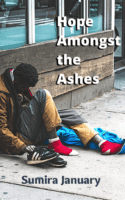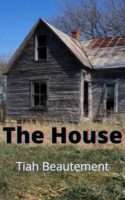One of the things people fear most in life is losing the roof over their head; losing their home. How about you? And no wonder. Immediately you become homeless you are thrown into a new existence: fear, hunger, cold, ill-health, hustling, indignity, humiliation, suspicion, and dreadful uncertainty. A world of just surviving, day to day.
As Ollie in Hope Amongst the Ashes says, “Rest? I’ll rest when I’m dead. I don’t think these people know what it’s like to go cold and hungry, constantly looking over your shoulder. … And people don’t treat you with dignity and respect, because you’re homeless. Lots of people wish they were the Bill Gates’s of the world, but nobody wishes to be homeless.”
What a great divide this is in our society: homed versus homeless! Our Constitution says in Section 26, “1) Everyone has a right to have access to adequate housing”. Yet sad to say, Ollie, from this story, is not unusual. It is estimated that there are about 200 000 homeless people in South Africa. (Read more about homelessness research here.
The stereotype picture in many of our minds of a homeless person is of a raggedy, dirty, sunburned, drug addicted or ‘mad’ street person.
And certainly, the tragedy of drug addiction can lead someone to the extreme of being homeless. Perhaps they become violent, perhaps they steal from family members to buy drugs, and are kicked out. Perhaps they lose income to pay rent, and anyway spend all their money just getting drugs.
It’s also true that some very serious mental illnesses, such as schizophrenia, can lead a person to suffer delusions and live mentally in an alternative reality. They become unable to co-exist with other people.
But as the story shows clearly, and as Ollie says, “Not every homeless person is a thief or addict.” This is not nearly the full picture and, “Sometimes bad things happen to good people.”
Why are so many people homeless in our country?
We can first look at what are called structural causes. These refer to problems in the way our society is organised and what resources it has at the moment. We have high unemployment, so many people are dependent, or poor. They cannot afford to rent or buy their own housing. Plus we have rural poverty, so many thousands of people flock to the cities to look for work.
At the same time, we have a great shortage of formal, government-supplied cheap housing. For many people, the housing that there is, is still too expensive. What about informal shacks? The story showed how Ollie could not even afford to rent the cheapest housing – a shack room in a backyard.
Perhaps he might have found a shack room far on the outskirts of the city for very cheap. But then how would he afford to get transport to the mall – any mall – to earn his few ‘survival’ rands per day?
Secondly, many people find themselves homeless for personal reasons. In the study linked above, the researchers found abuse and domestic violence, family problems, eviction, economic difficulties at home, and wanting independence were reasons.
Ollie was on the streets for very personal reasons. His parents died in a fire, and his heartless aunt and uncle mentally and emotionally abused him. They were emotionally cold, constantly complained about having to feed him, plus implied he was lazy and not even looking for work. He felt he had to leave.
In the story there are several details showing us the many unexpected difficulties of homeless life. Look at this, for example: “I can’t take books out as I can’t get a library card as I have no proof of address. Anyways they would only get damaged, and I would get fined.” And then there is Ollie’s relief when he discovers his backpack, with its ID have not been stolen. Think of all the things – including social services – you need an ID for.
Next, as the story shows, once you are homeless, it can be very difficult to get off the streets again, to keep hope alive. Here is an example of the kind of choice Ollie faced: “Sure, I could join a gang and live at their house for free. I was tempted when they tried recruiting me, but nothing in life is ever free – one way or another, you pay a price. My Dada said it’s better to have crooked teeth and straight morals.”
How are you going to come across in a job interview if you are in shabby clothes, ungroomed, and have no address or previous proper work experience to give? You will be treated with great suspicion. We sympathise when Ollie panics at the thought of the interview organised by Kitty: “I can’t.” I start pacing. “I’m not dressed for an interview. I’m not qualified for anything.”
In the story, Khetiwe’s experience of working in her parent’s homeless shelter means she can see past the stereotype of ‘homeless’, see how much Ollie has to offer: “Haiyini, you look just fine, and you started studying remember? You have Matric and you have great ideas. You shouldn’t be on the streets.”
Ollie is obviously the hero of this story: he keeps trying, never gives up hope, goes the extra mile to make relationships, as with Mrs Schmidt and Kitty. But Kitty is also a hero of this story, the person we look up to as a role model. She is a person of kindness and warmth and empathy, sees the humanity in every person, as well as being a person of action. She gets things done.
It’s sad to think of how many homeless people ‘out there’ just need a break like this, from a person like her, to start building a brighter future.
Hope Amongst the Ashes also shows very clearly just why free government social services are so very important, if we value everyone as equal and worthy. We see why in a caring society, money must not be what gets you an ambulance, and medical care. If that was the case, Ollie would be dead, for sure. He would have died a violent, cold, lonely death from stabbing and septicaemia, out on the streets.
And here, to end, is an idea whose time may have come, seeing as full employment is a distant dream in most places: a basic income grant for all.
Like many millions of young South Africans, orphan Ollie is young, and healthy, has never been trained, or had a formal job. So he can’t get any social services grant or unemployment benefit. What is he supposed to live on, in his circumstances? Crime?
A basic income grant is a simple idea that is simple to do. Every single adult in the country just gets a basic amount of money put into their account every month. There is no need for you to prove you are unemployed, and there is no room for corruption. Let’s say it is R2000. People who are employed or have other income and don’t need it automatically ‘pay it back’ to government because they are taxed. The amount can even be added onto their usual tax.
Yet it is a godsend for all the poor and struggling people who either earn so little, they pay no income tax, or have no income. And the poor people’s R2000 would circulate in our economy, and most probably, crime and other social ills would lessen. Wouldn’t that be great, and lower all sorts of government expenses like crime fighting and health care?
Here is more on a BIC
***
Tell us: What do you think of a Basic Income Grant for all adults in South Africa?



